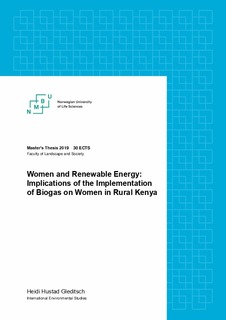Women and renewable energy : implications of the implementation of biogas on women in rural Kenya
Master thesis
Submitted version
Permanent lenke
http://hdl.handle.net/11250/2603661Utgivelsesdato
2019Metadata
Vis full innførselSamlinger
Sammendrag
This paper analyses how the implementation of biogas can have an impact on women in rural areas in Kenya. It looks at different aspects of women’s lives and investigates how gender roles, labour distribution, economy, health and time management are affected by the implementation of small-scale domestic biogas technology. To investigate this field of interest, I interviewed 41 women in rural areas of Kenya about their personal experiences on biogas. The findings show that the implementation of biogas has several benefits for women. Among the most mentioned were an improvement in economy through reduced expenses related to biogas production. Better health conditions and increased personal safety while cooking was also a positive change for many of the participants. Faster production and use of biogas compared to traditional energy sources, reduce time consumption. This allows the women to spend more time on other activities, such as hobbies and work outside the home. However, there are certain challenges and limitations related to biogas production and use, such as a lack of necessary resources that in some cases limit biogas production. Lack of funding, water and knowledge about biogas have in some cases restricted progress and these issues should be considered in the implementation of development projects. Findings suggest that there have been changes in gender roles in some of the households. Due to easier and faster cooking conditions, many men have started participating in cooking, causing some changes in labour distribution. The paper highlights women’s positions as producers, users and managers of biogas. The findings suggest that the participants have an influence on biogas technology as a result of their important positions as energy managers. This emphasises the importance of acknowledging women’s knowledge and experience with biogas and use this to help shape further development of the technology.

